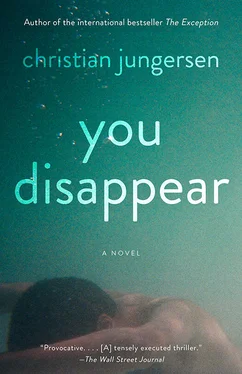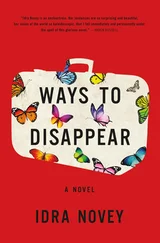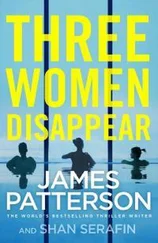Later he comes back out and positions himself across from me, standing with legs slightly spread and arms akimbo. He affects some sort of mechanical, military voice. “You have no right to speak to me in that manner. I was only trying to be friendly. I must ask you to govern your emotions the next time.”
In his stocking feet, he looks like Niklas and his friends would in the old days when they put on grown-up clothes and played theater. They thought they were saying adult things and spoke with great gravity and conviction, but that just made the performances all the more grotesque. This is the same thing; it isn’t Frederik’s real self, and I can’t control my laughter. “This is your idea of what a man’s like? This is your best effort? Ha-ha-ha! Really? You have no clue, do you. No clue at all!”
“I was just trying to say something nice to you before.”
“Yes, and you can bet that you did an excellent job of it.”
He continues with the same feigned briskness. “What we need now is for you to be constructive for a moment—”
“Ha-ha! You come across as even more ridiculous when you take yourself so seriously. But it’s a long mile from this circus to the real Frederik.”
For a moment his sergeant’s voice seems authentic; his anger animates it, and he actually sounds a bit like a man. “Mia, the reason you can’t work things out with me is that you’re sick in the head! You have Capgras syndrome!”
“You’re the one who’s sick in the head!”
He walks toward the wall.
“Watch out, Frederik. There’s broken glass there!”
But he doesn’t listen.
“ Ouch! Damn it!”
“Oh Frederik!”
“And I didn’t say anything about suicide! I didn’t !” he whimpers as he hobbles out to the bathroom.
I follow him there, where he seats himself on the toilet lid and raises his wounded foot. I take hold of it to examine it — and he lets me. There’s just a small cut on the ball of his left foot, just a little dome of dark, thick blood. I find tweezers. And I grasp him gently by the heel, softly stroking his arch, the ball of his foot. There is a glass splinter there, and I remove it.
It’s the oddest thing to kneel on the bathroom floor with Frederik’s foot in my hand. His long, delicate, thin-skinned foot, with its prominent network of blood vessels on the upper side. A foot I know so well.
I put an adhesive bandage on it and look him in the eye, smiling at him. I run my finger across the bandage. For a few moments I am nice to him. Once I was that way to him for month after month, and in this moment I am like that again.
He alternates between looking at me inquiringly and looking shyly away. He tries to smile at me, yet I see the weeping there as well. His muscles lose their tension, they relax, but I also see how he gets a grip and pulls himself together. Everything in his face blurs together, like an ink-jet print in the rain, and I feel the same way. Our faces are sludge, both of them, the very same sludge.
I can’t help myself; I take care of him. And at the same time I can tell it’s been a long time since I’ve had the energy to.
• • •
I lie twisted on Thorkild and Vibeke’s wretched couch, alone in the half darkness, my torso slung against the stiff armrest, my eyes pressed to my forearm. The roof of my mouth hurts from yelling and crying. And I’m so tired; I can no longer shout, and my muscles are all achy and tender, as if I’d been marinating in my own bitter juices.
Maybe Frederik could come back and take me now … I don’t know. I might strike him much harder, this time without a cushion. Or maybe I would yield, and that might be the best thing that could happen for all of us — more than twenty years ago, meeting on the broad sand beach near the school camp, having Niklas … I don’t know.
But he doesn’t return for another attempt. He’s not that sick.
I sleep; I wake; I’m still on my in-laws’ couch. Frederik hasn’t installed all the lamps in here yet, so the room has a golden light that’s weirdly uneven. I wonder what time it is.
This is what Vibeke calls our first couch , just like the dinner table is our first dinner table . It’s a classic, upholstered in blue wool, which also covers its slender sloping arms. Here they sat almost half a century ago and played with little Frederik; here Vibeke nursed him while Thorkild smoked a pipe, listened to Miles Davis, and conversed with his headmaster friends. I can’t say that I’m comfortable lying here, yet I can tell I’ve slept deeply.
On the ceiling, I see a patch of light move. It looks like the sign on the ceiling back home on Station Road, though it can’t be the same thing. That sign came from the tree branches moving in front of the streetlight. And it appeared in the embers where Niklas lit a fire on the lawn.
It can’t be the same sign, but it is ; I recognize the pattern, the smoldering sign in the embers that proclaims our curse.
Am I dreaming? I look around the living room. Everything looks unfamiliar because we’re still strangers in this apartment, surrounded by strange furniture. But it also looks real, and this doesn’t feel like a dream in any way.
I’m running down a sandy road along the Majorcan coast, away from the car accident in which Frederik and Niklas tumbled over a cliff and died.
I’m running down the sandy rainy beach in Sweden where I met Frederik, where we became each other’s fate.
I’m running down the sandy path along Lake Farum. I played tennis yesterday, I’ll play again tomorrow, the heat, the sun, the sweat on my brow and under my breasts, I’m running. I’m running.
And overhead the sign in the sky follows me, the light that throbs, that smolders, that grows in strength. Surely, everyone must be able to see it now.
But the sign grows much stronger, and its reflections in the Mediterranean, the Kattegat, and Lake Farum are so blinding I have to kneel, my bare knees pressed against the sand and pebbles.
And as I kneel I hear a voice. Booming, close at hand, a voice from the heavens. It’s like thunder, and I cannot distinguish the words it says.
“Who are you? Are you Jesus?” I ask.
“I’m not Jesus. There is no Jesus, Mia,” says the voice.
“Are you God?”
“You know perfectly well that God’s an illusion of your prefrontal cortex.”
“But who are you then?”
“I’m like you, I have no soul. I am my brain, and my brain’s a labyrinth of synapse and fat.”
For a moment I dare to squeeze open my eyes to two chinks, and in a flood of light I see a clean-shaven, grey-haired man with a round head and glasses that are much too large, the kind that were the fashion in the ’70s. I recognize him; it’s Peter Mansfield, one of the physicists who won the Nobel Prize for developing the technique of MRI scanning. He stands quite close to me in the sand, and the light radiating from him is so strong that it’s as if Heaven itself has opened. I have to squeeze my eyes shut again if I’m not to go blind.
“Now I know that I’m dreaming,” I tell myself aloud.
“Believe what you like,” Mansfield says. “But you should only hold on to your belief if you can prove it. The empirical method’s the only path to truth.”
“What do you want from me? Why have you come here?”
“I’ve come to tell you that you’re blessed by the mercy of science. This is no dream, Mia. It’s a gift of grace; all your sins and all your guilt have been taken from you.”
“But I’ve been deceiving my sick husband. I’m sleeping with his lawyer.”
“You can’t help it. If that’s what you’ve done, it is Nature’s will. You’re nothing more than atoms in motion. Anything you do is merely part of a process that Nature initiated billions of years ago. Every decision you make could have been predicted back then.”
Читать дальше



![Ally Carter - [Gallagher Girls 01] I'd Tell You I Love You But Then I'd Have to Kill You](/books/262179/ally-carter-gallagher-girls-01-i-d-tell-you-i-lo-thumb.webp)








